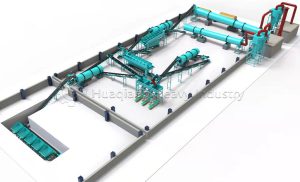For foreign farmers, efficiently producing high-quality organic fertilizer requires more than just a single production line—those seemingly “auxiliary” fertilizer equipment are actually key to improving production capacity and quality. Did you know? A complete organic fertilizer production chain truly adapts to diverse agricultural needs thanks to the addition of supporting equipment.
Take raw material processing, for example. In addition to the fermentation compost turner, the core of the production line, a pre-treatment pulverizer is also required to break up large pieces of straw and dead branches to ensure more complete fermentation. For high-moisture livestock and poultry manure, a dehydrator reduces the moisture content to prevent spoilage during fermentation.These early-stage supporting equipment directly “clears the way” for subsequent production, increasing fermentation efficiency by over 30%.
The role of supporting equipment becomes even more pronounced once the granulation stage arrives. To produce small-granular organic fertilizer suitable for greenhouses, the production line’s disc granulator needs to be paired with a screening and grading machine to sort and classify the granules. If the customer requires slow-release organic fertilizer, a coating machine is also required to coat the granules with a biodegradable coating, extending nutrient release. These flexible combinations allow a single production line to produce a variety of fertilizer specifications, easily adapting to diverse cropping scenarios, such as vegetables, fruit trees, and lawns.
More importantly, these supporting equipment can also open up the “organic fertilizer +” industry chain.For example, by connecting it to a compound fertilizer mixer, an appropriate amount of inorganic nutrients can be added to organic fertilizer, creating an organic-inorganic compound fertilizer. Paired with a microbial addition device, it can produce bio-organic fertilizer rich in functional bacteria. This “one primary, multiple secondary” equipment model preserves the ecological advantages of organic fertilizer while addressing the nutrient limitations of single fertilizers, perfectly meeting the dual pursuits of “green and efficient” production sought by international farms.
From raw material pretreatment to finished product customization, the close collaboration between the organic fertilizer production line and its supporting equipment not only reduces production costs but also makes the fertilizer products more accessible.



